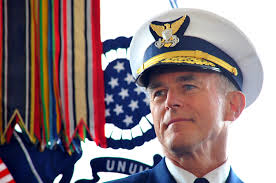Coast Guard seeks to deliver protection against “invisible” attacks.
United States Coast Guard Commandant Vice Adm. Paul F. Zukunft in a keynote address at the Center for Strategic and International Studies on June 15 said that while the U.S. port facilities have hardened their perimeters and they now notify the U.S. Coast Guard of intrusions in order to identify possible coordinated attacks, there is a notable hole in the area of cyber security.
Zukunft said in the U.S. energy sphere it’s time to come to grips with “the invisible intrusion—the virtual intrusion.”
Shale boom shifting U.S.’s position to global energy supplier
Zukunft talked about the shale boom delivering an explosion in U.S. oil and natural gas production, and he expressed his concerns about the coming exports of U.S. natural gas in the form of liquefied natural gas (LNG).
“By most estimates, by the year 2020, the U.S. will be a net exporter of energy,” Zukunft said. … I look at the fracing—shale—the potential of that for the next 30 years, if not longer. I need to make sure the Coast Guard is postured for this growth sector in American industry; it’s going to be very cyber-dependent going forward.”
Will LNG transport become a geopolitical cyber warfare target?
“When you think of the United States [and] exporting LNG, what is modern warfare going to look like in the 21st century? Do do we have adversaries among us today at a national level? Forget about the non-state actors, but at a nation level. Right now who has the natural gas market niche in the EU and in parts of the Asia Pacific region? It’s not us. It’s Russia,” Zukunft said.
“And so what if we’re now taking some of that market share? And what if tensions escalate between us and Russia? Does Russia conduct electronic warfare against our military? Or might they want to conduct electronic warfare against our critical infrastructure? That is an example where we need to protect our infrastructure,” Zukunft said, referring to the vulnerability of the IT network infrastructure in the energy exploration and transport industries.
It can get lonely out there in 7,000 feet of water
Zukunft told a story about a mobile offshore drilling unit (MODU) that was taken over by remote intrusion. “They rely very heavily on dynamic positioning systems, and this mobile offshore drilling unit drove off the well site, because malware was introduced into the server — because employees aboard this MODU thought they could access anything on the Internet.
“Malware was introduced, and now you have this mobile offshore drilling unit—think the Deepwater Horizon, because it’s in 7,000 feet of water—it drifts off. Fortunately the blowout preventer kicked in and shut it down.”
Zukunft said most of the problems related to cyber security breaches are related to human use of the networks and a lack of motivation to follow proper “cyber hygiene.” He also asked for a protocol of reporting to help identify and thwart coordinated cyber attacks on the energy transportation infrastructure.


